THINK GLOBAL
Act locally with Global Justice Now
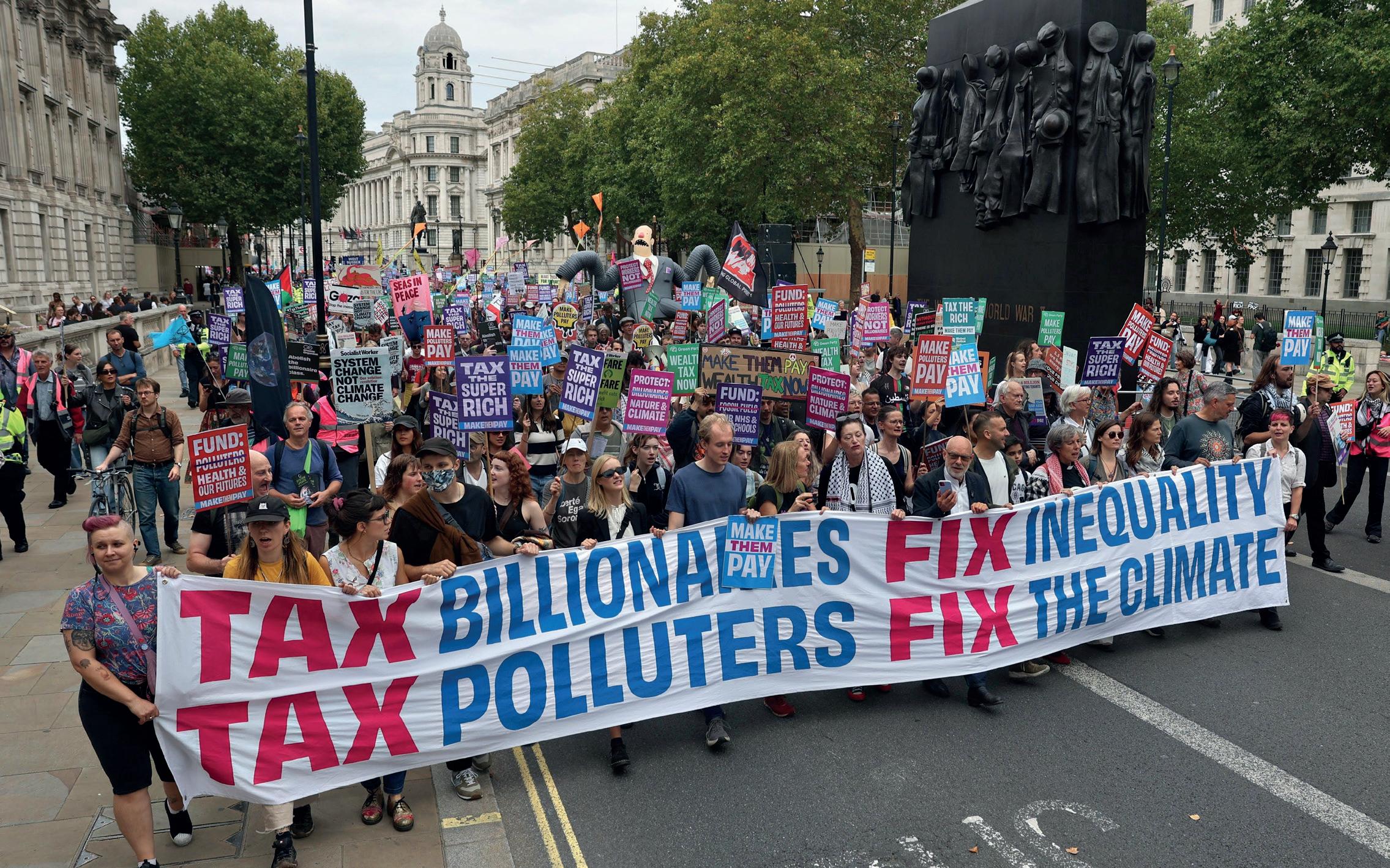
October 2025
Inserts
• BRIEFING: Make Them


October 2025
• BRIEFING: Make Them

Think Global is Global Justice Now’s activist newsletter, published three times a year, with monthly email supplements (Think Global Extra)
Editing: Daisy Pearson, Guy Taylor and James O’Nions
Cover photo: Make Them Pay demo in London, 20 September.
alternative Many of us are watching recent events with growing alarm. The far right is mobilising at frightening speed in the UK and beyond.
Seema Syeda Trade campaigner
The genocide in Palestine, financed and armed by the UK and Europe under Starmer and EU leaders as much as by the US under Trump and Biden, is one of the epicentres of rising fascism, as well as the resistance to it.
The same billionaires financing Israel’s genocide are also the ones financing the UK far right. US tech billionaire Robert Shillman, a former board member of Friends of the Israeli Defence Forces, is one of Tommy Robinson’s key financial backers. His money helped stage the ‘Unite the Kingdom’ rally in London on 13 September, which mobilised tens of thousands of people under the banners of anti-immigration and ‘free speech’ – the biggest far-right mobilisation in the UK in decades.
This is a dangerous moment. But in a polarised society, the balance depends on which side is better organised, communicates more effectively, and offers the more compelling alternative. That means we must amplify our arguments and campaigns with clarity, credibility and confidence.
Despite the size of last month’s far-right march, they are still far from matching the scale and persistence of the Palestine solidarity movement. As you’ll see later in Think Global, there’s a call to make the second-anniversary protest on 11 October the biggest yet—be there if you can.
But this isn’t just a contest of numbers. It’s a battle for hearts and minds that will determine the course of history. We need to show that our real enemies aren’t vulnerable and desperate people arriving in small boats, they’re in mansions and yachts, in the boardrooms of corporations, and sometimes in the White House and Downing Street. This is why campaigns like Make Them Pay and Stop Trump are so important.
Climate collapse, colonialism, genocide and economic crisis are systemic crises driven by the billionaire elite. When ordinary people unite across borders to confront them, we have the power to defeat them, and to begin building another world from the ashes of the old.
We’ve had strong media coverage across our campaigns in recent months. On Palestine, The National covered an open letter we coordinated with 11 other civil society organisations, calling for the UK to halt trade with occupied Palestine and end arms sales to Israel. We also worked with former Scottish first minister Humza Yousaf on an opinion piece for PoliticsHome and arranged an interview with the New Statesman podcast. Soon after, the Scottish government introduced targeted measures against Israel – a campaign win made possible by tireless activism on the ground. Head of Scottish campaigns Liz was quoted in The Herald welcoming the news.
On climate, much of our focus has been on Make Them Pay. We helped secure an article by John Moloney of PCS in the Morning Star, backing the campaign’s demands. Campaigner Izzie also wrote in the Big Issue ahead of the mobilisation, explaining why, in the face of far right organising, it’s vital to fight back and expose the real harm caused by billionaires and the super-rich. Journalists from several outlets covered Make Them Pay on the day, showing real appetite for our work.
On trade, much of our focus has been challenging Trump’s unprecedented second state visit to the UK (and trip to Scotland). PA Media covered Stop Trump’s mobilisations in London, quoting director Nick. Nick and trade campaigner Seema were interviewed by outlets including BBC, Sky News, the Guardian, LBC, Al-Jazeera, WIRED, and Desmog. Scottish media also showed huge interest, with media manager
Trade justice
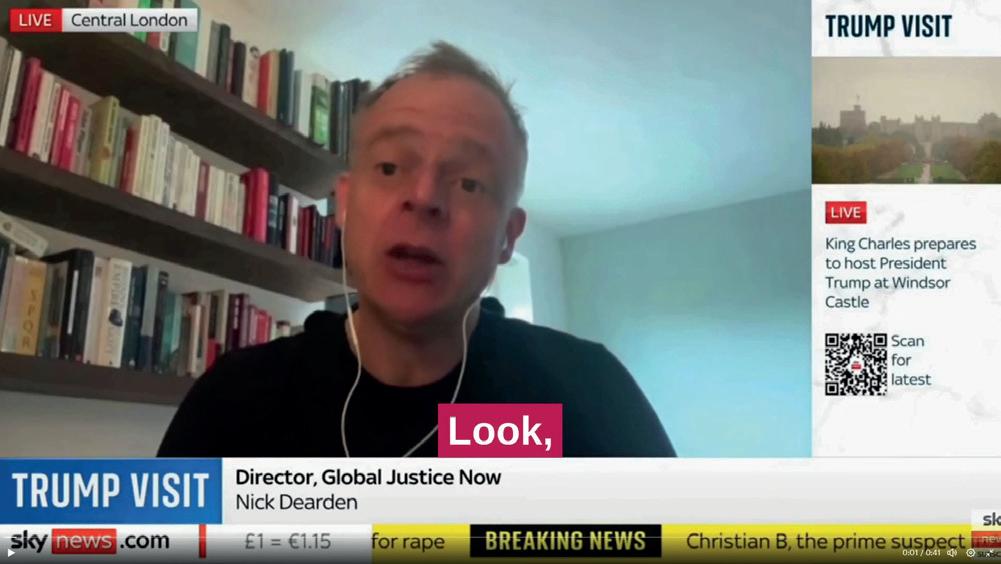
Director Nick Dearden speaking on Sky News about the Stop Tump demo, 17 September.
Anita and Liz speaking to LBC, BBC, STV and others. Meanwhile, the UK now faces its first ISDS case over scrapping plans for the Cumbria coal mine – a story we broke that gained coverage in the Guardian, BBC, Byline Times and more. Elsewhere, Cleodie spoke to BBC Asian Network about the UK-India trade deal.
At such a busy and critical time for our organisation, and global politics, council has many priorities to juggle. One of council’s key responsibilities is making sure working at GJN is as equitable and rewarding as possible, while delivering on our goals. Our staff are our most important asset; looking out for them is a critical part of our role. We’ve implemented a shorter working week to balance wellbeing with efficiency and tried to ensure pay is fair in the context of the cost of living crisis. After a successful trial run, our staff now work a nineday fortnight, with the Global Justice Now office closed every other Friday.
Campaign against ISDS with the Cumbrian coal mine materials
Read up on critical minerals with the new report
Climate justice
Sign and share the petition against fracking in North Yorkshire
Plan a march/rally/activity for the 15 November Make Them Pay day of action during COP Palestine
Join the huge demo on 11 October in central London
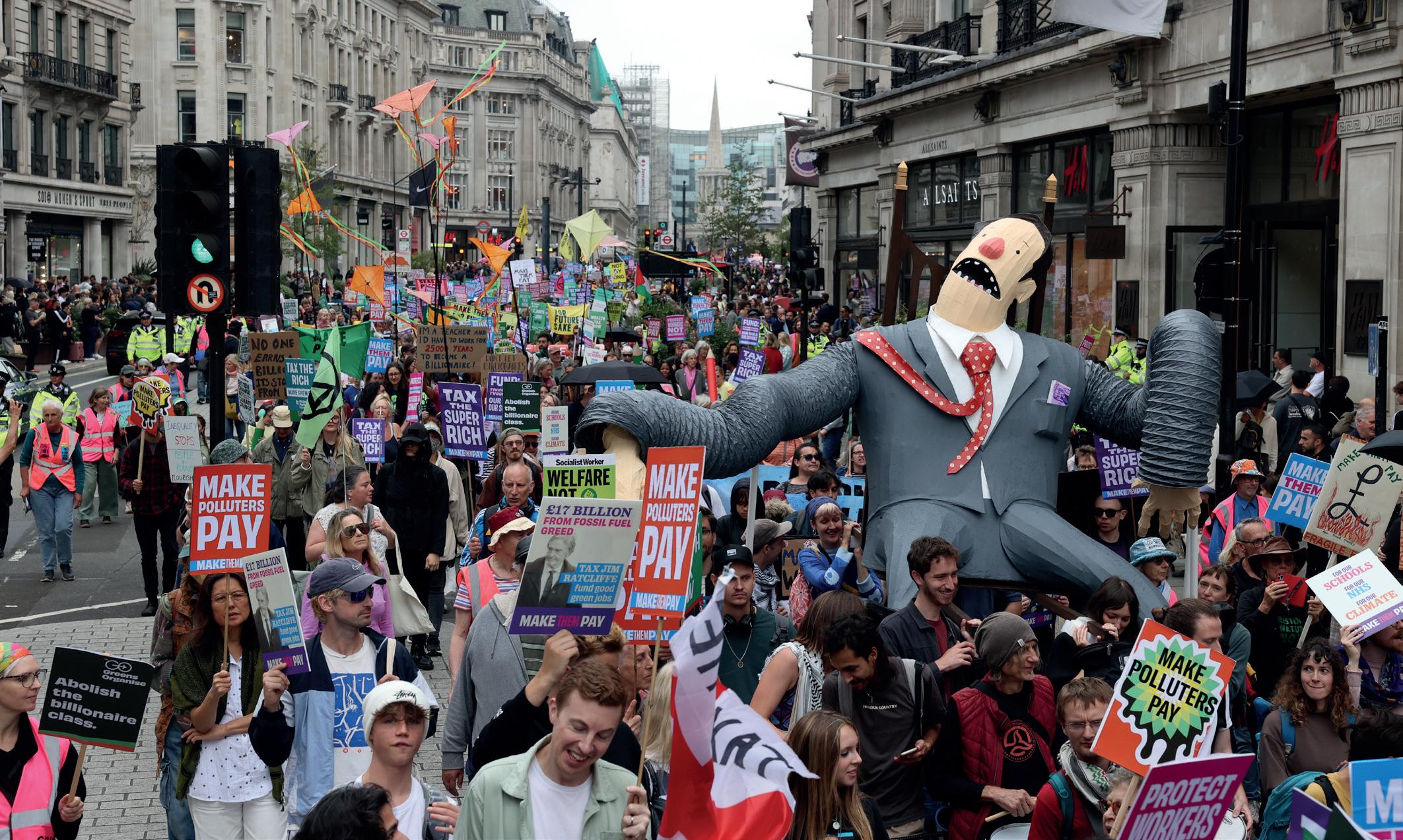
On Saturday 20 September, movements united to bring thousands of people onto the streets of central London with a demand to Make Them Pay. We were joined by a host of exciting speakers: leader of the Green Party Zack Polanski, legendary musician Brian Eno, economist Gary Stevenson, influencer and activist Dominique Palmer and Tax Justice UK director Faiza Shaheen.
Over 100 organisations and groups have now publicly supported Make Them Pay. Climate activists, trade unionists, wealth tax campaigners, Palestinian solidarity activists, migrant justice groups and more all united behind a clear message: that it is billionaires and polluting corporations who are breaking our public services and destroying our world.
If you joined us, thank you. But don’t worry if you weren’t able to come this time; this is just the beginning.
Make Them Pay is gearing up for the global day of action during COP30 on Saturday 15 November. With the autumn budget coming just 11 days later, it’ll be another key moment for us all to come together, this time across the country, to fight for billionaires and big oil to pay for climate action and a society that works for the people who keep it running, not the rich and powerful! There will be organised demos in London and Glasgow, but we’re encouraging you all to mobilise in your local areas.
This is a brilliant chance to engage your communities in Make Them Pay and its message. With the cost of living still biting, placing economic justice at the heart of climate campaigning is key to rebuilding support for it, and countering the rise of the far right. Organise a march, rally or stall and use our outreach flyer to engage the public. For support
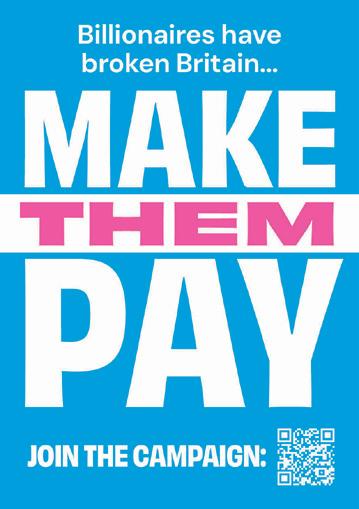
and ideas to help you plan, contact activism@ globaljustice.org.uk
You can read in more depth about the campaign’s key demands in the briefing included in this edition of Think Global. This is also a great material to hand out at stalls.
Activists in North Yorkshire have found themselves at the forefront of another battle against fossil fuel extraction in the UK. Oil corporation Europa has submitted an application to frack for climate-wrecking gas off the coast near Scarborough. Critical loopholes in the UK’s fracking ban have made this possible, and while Ed Miliband recently announced that he would be strengthening the ban, the government has yet to guarantee its changes would outlaw this project in time, if at all.
Local group Frack Free Coastal Communities have been busy fighting off this proposal, which North Yorkshire Council is likely to reject or approve in mid-October. Right now, campaigners are focused on pressuring councillors to reject Europa’s application. If you live locally and want to get involved or find out more, email activism@globaljustice.org.uk.
If you aren’t in the local area, you can still sign the petition to close the loophole in the fracking ban which is enabling this proposal possible: tinyurl.com/no-fracking.
While the fight against climate change and corporate power continues across movements in the UK, our friends at the Fossil Fuel NonProliferation Treaty have been organising a conference on the international fossil fuel phase out, which Colombia is hosting next spring.
This conference will be a world first, providing a global platform for countries to strategise a phase out of fossil fuel extraction. We’ll be working with the treaty team on anything we can do to support this exciting event and will keep you updated as plans develop!
Global Justice Now groups and activists came out in large numbers for the climate mass lobby that took place at the Scottish parliament in mid-September. 250 people came to lobby their MSPs for urgent, fair action on the climate emergency, including a call for the Scottish government to back the Fossil Fuel Treaty.
A big aim of the climate mass lobby was to demonstrate to MSPs that for many of their constituents climate justice is an urgent issue needing bold action and leadership, especially with the Scottish government’s climate action plan soon to be published, and a Scottish parliament election next year. The huge turnout of constituents from all of Scotland’s seven parliamentary regions certainly achieved this.
Make Them Pay Two-page A4 campaign breifing (NEW Sep 2025)
Make Them Pay A5 leaflet (NEW Sep 2025)
The Fossil Fuel Treaty Six-page briefing (Jan 2024)
Let’s clear the way… A5 FFT leaflet (Jan 2024) (Also available in Welsh)
How to convince your council to endorse the FFT Four-page guide (Jan 2024)
Find many more FFT materials at globaljustice.org.uk/resources and order from activism@globaljustice.org.uk
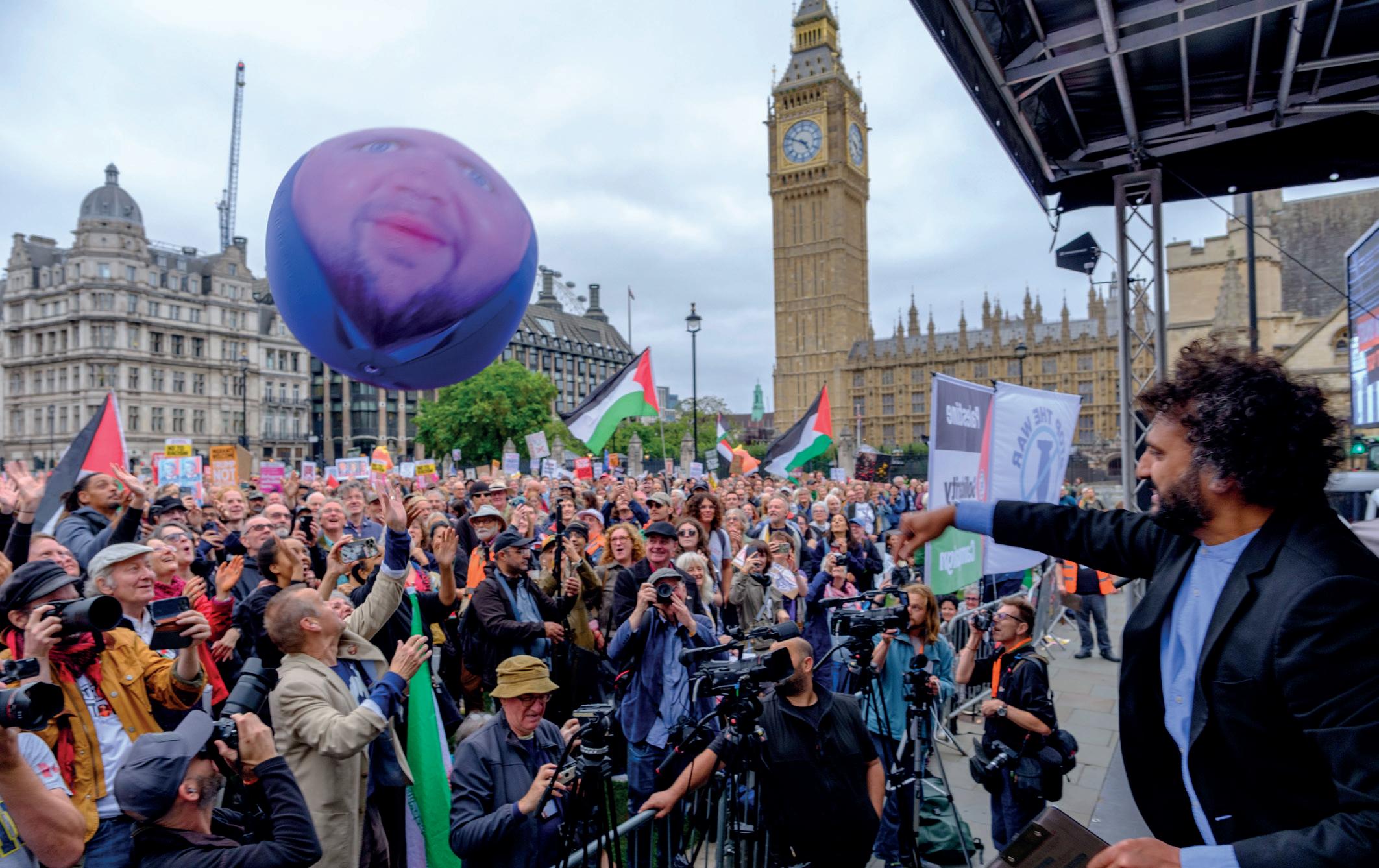
Mid-September, Trump and his billionaire oligarch backers from US big tech descended on Windsor to dine at a lavish state banquet with the king and Keir Starmer.
The banquet represented the continued carving up of the UK digital services economy in favour of the big tech monopolies, with billions of pounds of government procurement contracts handed out to US tech companies.
Thousands turned out in London on Wednesday 17 September to say that Trump is not welcome in the UK. Speakers included George Monbiot, Zarah Sultana and PSC director Ben Jamal, and attendees were treated to a live performance by Billy Bragg. These protests kept Trump out of central London; his state visit was conducted hidden inside Windsor Castle and Chequers. Even there, locals came out to protest.
Peter Mandelson’s much vaunted ‘technology pact’ – less a deal than a political gesture –threatens to entrench US big tech dominance in the UK, undermining democratic control over data, regulation and the wider economy. Rather than delivering jobs and security as Starmer claims, the mass rollout of AI risks widespread job losses, while his answer to its huge energy demands, nuclear deregulation, puts workers’ security and public safety on the line to appease corporate interests.
A small comfort is that the pact does not include any promises to drop the Digital Services Tax, a victory for our campaign to keep the tax.
As we updated on in the last Think Global Extra, the UK is being sued via corporate courts for halting a coal mine. The Cumbrian mine, controversial, highly polluting and opposed by
environmental campaigners, was eventually quashed by the UK’s high court last year – ruled unlawful due to its climate impacts.
The government’s insistence on keeping corporate courts in our trade deals means ISDS clauses can be exploited by corporations to extort billions of pounds, exactly what the West Cumbria Mining company is setting out to do.
The first ever ISDS case taken against the UK is a watershed moment in our campaign, as the UK government has long argued against demands to scrap ISDS, claiming “we’ve never been successfully sued”. We’re busy working with movement allies, engaged MPs and investigative journalists to raise the profile of the case and get answers from the government.
This closer look at the amounts of these ‘critical minerals’ sought and what they are used for shows we don’t need to build a green future on the exploitation of poorer countries. But there is a material case for fundamentally rewiring our economy, rethinking what we produce and for whose benefit. We argue for shifting the UK’s demand for minerals towards socially useful sectors, rather than mindlessly growing the ‘mineral pie’ for the likes of the military industry, with questionable gains for the UK public and the risks of human rights abuses and environmental harms in sites of mineral mining.
The UK is being sued for halting a coal mine
Our petition for the UK to call time on corporate courts has over 7,500 signatures. With this case hitting the news, it’s a good moment to get out and collect more. To help you, we’ve made a new action flyer for stalls and events, with a QR code linking to the petition.
We hope this research give you stronger evidence and arguments against the false opposition of achieving an energy transition and standing against increasing extractivism overseas. If you would like to order more copies to share with others or take to events, email us at activism@globaljustice.org.uk.
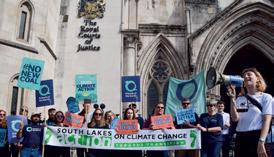
If you’ve been thinking of reaching out to your local MP on the topic of ISDS, now is a great time do so with a corporate court case coming home to roost. You can order materials from us and get advice on preparing for meetings by reaching out to activism@globaljustice.org.uk.
Included in this mailing is a copy of our newly published research report: Material realities: Who needs ‘critical minerals’ and at whose expense?
We’ve analysed demand for those much talked about ‘critical’ minerals, such as lithium, cobalt and graphite. Our research found over half of minerals designated as ‘critical’ by the UK play ‘no major role’ in the green transition, and that the often-harmful mining of these resources is largely being driven by militarisation.
The UK is being sued A5 leaflet & petition sheet (NEW Sep 2025)
Material realities 16-page report (NEW Aug 2025)
A trade deal with Trump Nine-page campaign briefing (April 2025)
The dangers of the US trade deal MP briefing (April 2025)
Talking points: UK-Colombia investment treaty Two-pager cheat sheet (Feb 2025)
Standing up to corporate power with Colombia Eight-page booklet (Jan 2025)
Stand with Colombia against corporate power A5 leaflet (Jan 2025)
Scrap the UK-Colombia investment treaty MP briefing (Oct 2024)
Resisting green colonialism for a just transition Six-page briefing (May 2024).
Contact us to order these or view them at globaljustice.org.uk/resources

Israel is advancing its plan to destroy Gaza City, one of the last parts of the territory that it hasn’t already levelled. It is difficult to deny the many accusations of ethnic cleansing of Gaza.
It looks as though the EU may soon impose sanctions on Israel, including suspending the bloc’s trade agreement. Currently, workers in Italy have organised a general strike in solidarity with Palestine – building more pressure on their government to take action. We must take inspiration from them – and pile the pressure on our own government to do the same.
The UK government is already facing huge pressure to do more and it did move to officially recognise Palestinian statehood in September. But without measures to actively hold Israel accountable, limit its capacity to wage war on Palestinians, or end the UK’s economic complicity in the occupation, this move is largely symbolic.
Please keep writing to your MP, urging them to demand the UK suspends its trade deal with Israel, bans all trade with Israel’s illegal settlements and bans all arms sales to Israel.
We see a lot of MPs who speak out in defence of Palestinians but fail to back any of these meaningful measures – often they will list the measures that the government has taken so far, including sanctioning small numbers of illegal settler groups and pausing talks over a planned trade deal with Israel.
If you would like to host a talk on the need for sanctions against Israel, our Palestine campaigner Tim Bierley would be keen to join you. We’d be very happy to work with other groups organising for Palestine in your local area. Please email Guy if you would like to arrange a talk.
In Scotland, we have been urging the Scottish government to call on the UK government to use trade sanctions against Israel. More than 500 Global Justice Now supporters emailed the Scottish government trade minister demanding this. And we worked directly with former first minister Humza Yousaf MSP who wrote an opinion piece Politico and did an interview on the New Statesman podcast echoing our campaign demands.
Our pressure paid off. In early September, the Scottish parliament held a debate on Palestine, in which the first minister gave a statement also echoing our calls for trade sanctions on Israel. He urged the UK government to go beyond its pause on trade talks with Israel and to withdraw completely from the UK-Israel Free Trade Agreement, to ban the import of goods produced in Israeli settlements in the Occupied Palestinian Territories and to end all licenced arms exports. He also promised that the Scottish government will not give any more public money to companies in Scotland that sell weapons to Israel.
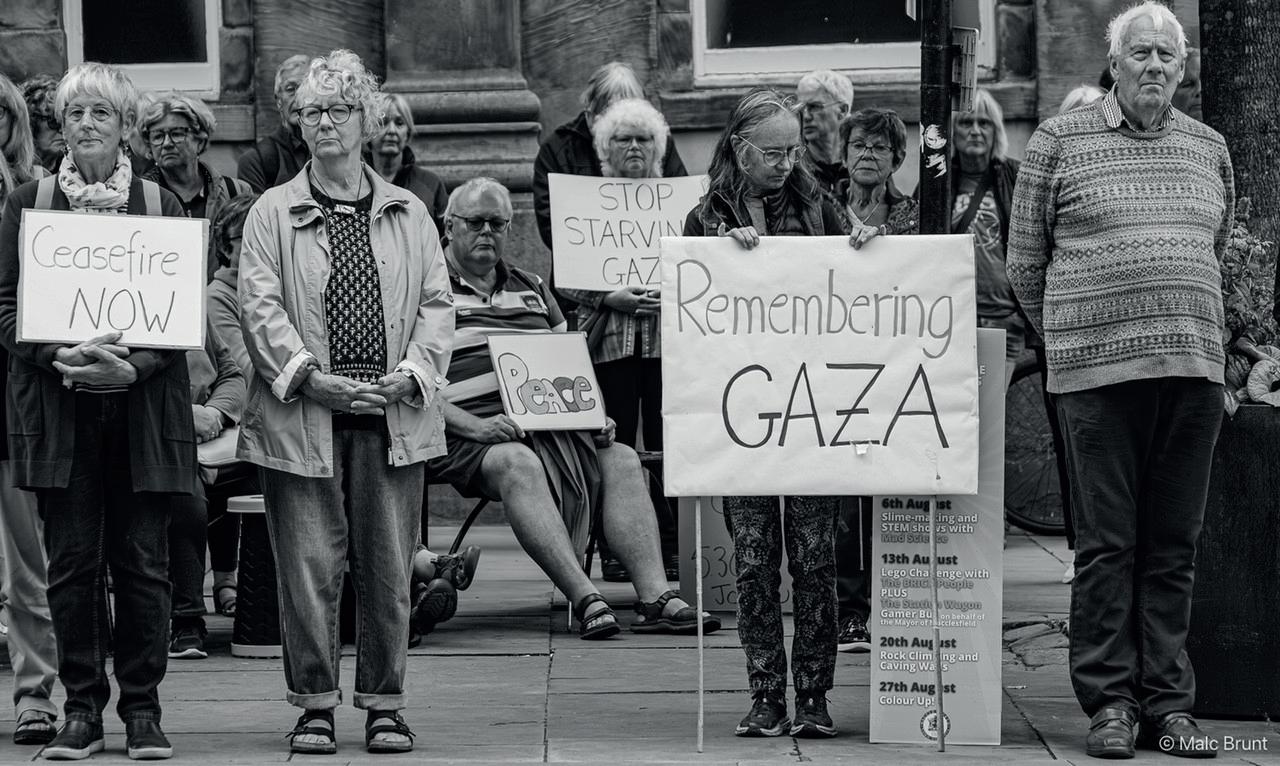


Join us in London on Saturday 11 October to mark two years since the genocide in Gaza began. Over 64,000 Palestinians have been killed in Gaza including: 20,000 children, 1,500 healthcare workers, 248 journalists, and 500 aid workers. Organisers are trying to make this demo the biggest one yet, to let the government know that we won’t stand by silently.
Time for sanctions on Israel Two-page leaflet (April 2025)
The case for sanctions on Israel’s economy
Four-page briefing (April 2025)
Sanctions petition sheet (April 2024)
End UK complicity in Israel’s war crimes
Four-page briefing (Sep 2024)
Stop arming Israel Two-page leaflet (2024)
Stop arming Israel petition sheet (2024)
Contact us to order these or view them at globaljustice.org.uk/resources
Global Justice Cambridge had a successful time at big community carnival in June. They shared a stall with the local Patients Not Passports group.
Global Justice Dundee has been part of a regular protest each Tuesday at Raytheon’s facility in Glenrothes, Fife against this company’s involvement in the arms trade with Israel as they are aiding and abetting Israel’s genocide in Gaza.
Rotherham for Global Justice hosted a talk by local MP Sarah Champion in her role as chair of the International Development Select Committee. They got a good audience and people were inspired to carry on campaigning by her obvious optimism
Global Justice York, with Parents for Future North Yorkshire, finally got York City Council to endorse the Fossil Fuel Treaty after 10 months of campaigning, the first council in Yorkshire to do so! On 9 August they participated in a vigil to mark Nagasaki Day and held a stall at the Fulford Show on the August bank holiday, collecting signatures calling for sanctions on Israel.
Global Justice Bradford held a mid-summers pantomime as part of the ongoing divestment campaign on West Yorkshire Pension Fund. Their weekly vigil continues relentlessly, in December they will reach their 4th anniversary. They took part in the Yorkshire Food, Farming and Health festival in mid-September.
Global Justice Nottingham had a successful barbeque and fundraiser social, but were dismayed that the annual Green Festival was undermined by the insurance company, who threatened to pull out at the last minute if any stalls of a political nature were hosted. Local groups are organising to respond to this censorship.
Global Justice Macclesfield took part in the mass climate lobby in July and had a good

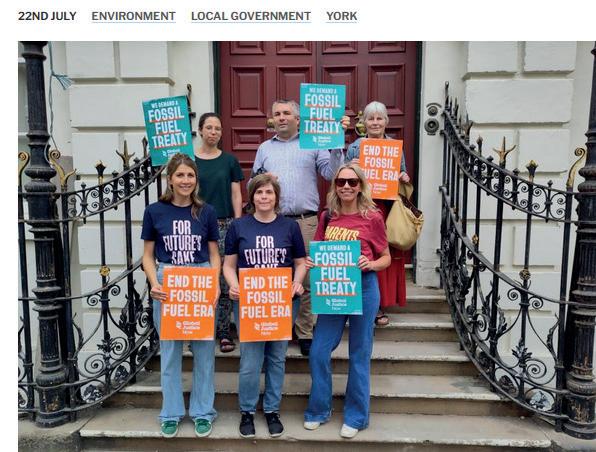
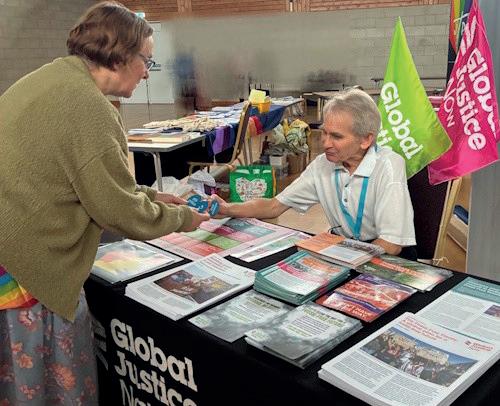
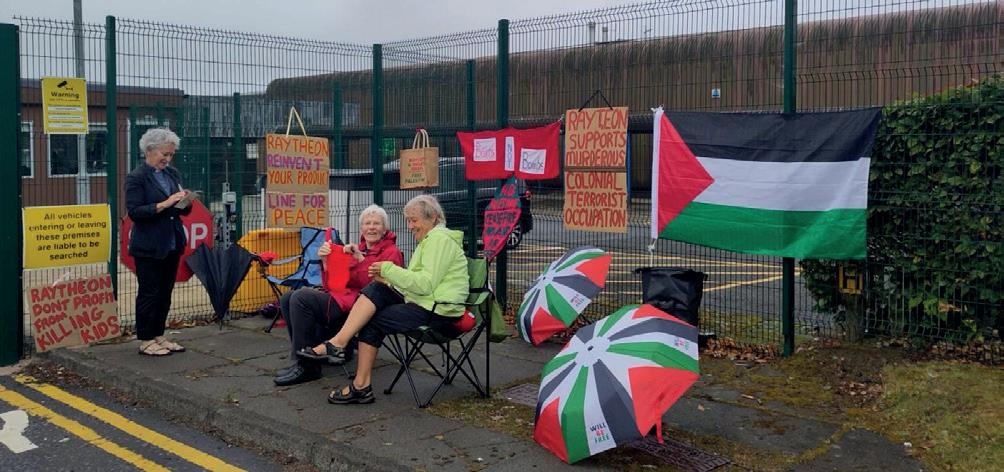
From top: Global Justice York’s media coverage after getting the council to endorse the Fossil Fuel Treaty; Global Justice Leicester holding a stall at the National Justice and Peace conference in July; Global Justice Dundee protesting outside Raytheon in Fife.
discussion with their MP. He also responded positively regarding the UK/Colombia trade deal, taking it up with the trade minister. In July they held an hour-long silent vigil for the crisis in Gaza outside the town hall. The vigils are now monthly with over 100 people joining each time.
At the time of going to print we are in the middle of a packed freshers fair season. Each fair will be followed by a post-freshers event. In some places we’re organising casual meet-ups, in others events such as talks on the Fossil Fuel Treaty or tailored sessions like Canterbury’s “No to Trump’s Tech-bro trade pact”.
In June the Global Justice Youth Summer School brought together 25 young people from across the UK for three days of training and political education in London. Sessions ranged from campaign training, teaching skills like powermapping and narrative strategy, to broader discussions on corporate power and climate justice. Michelle Meagher, author of Competition is Killing Us, spoke on the dangers of monopolies and billionaire power, while Nick, our director, spoke on trade justice and the global south. We also had contributions on Latin American feminism, Palestine solidarity and practical workshops run by staff and youth members. The event has already led to people taking on new roles within their local groups and universities such as at Sussex Uni.
Over the summer, groups have continued pushing our campaigns. Global Justice Youth Manchester have been working to get the Manchester Climate Change Partnership to endorse the Fossil Fuel Treaty, focussing on universities and faith groups within the network. Manchester youth members have also been preparing to attend The World Transformed (TWT) – a weekend festival of radical politics, art and culture in Manchester this autumn. A delegation of youth network members from across the country will attend TWT together.
Global Justice Youth London have been building a prop of a globe torn by a digger to symbolise the harmful effects of mining critical minerals, which they will use as a street stunt. Their
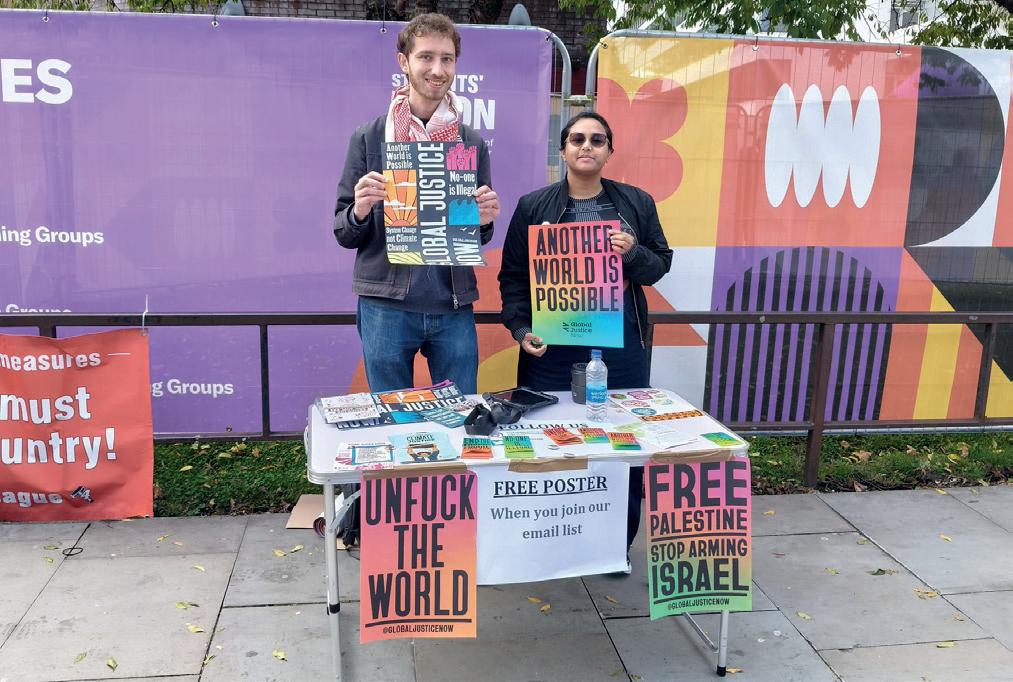
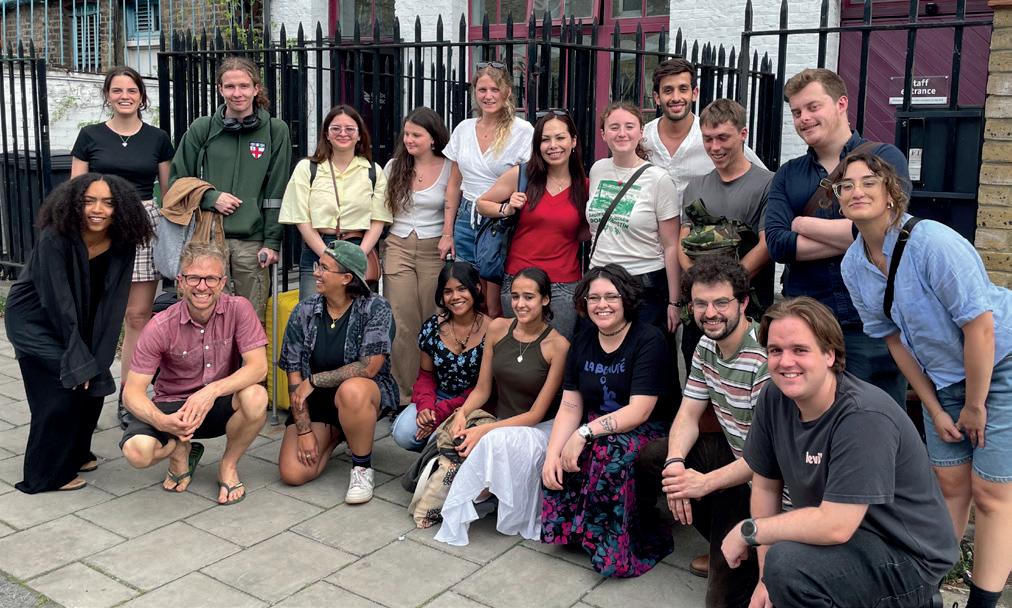
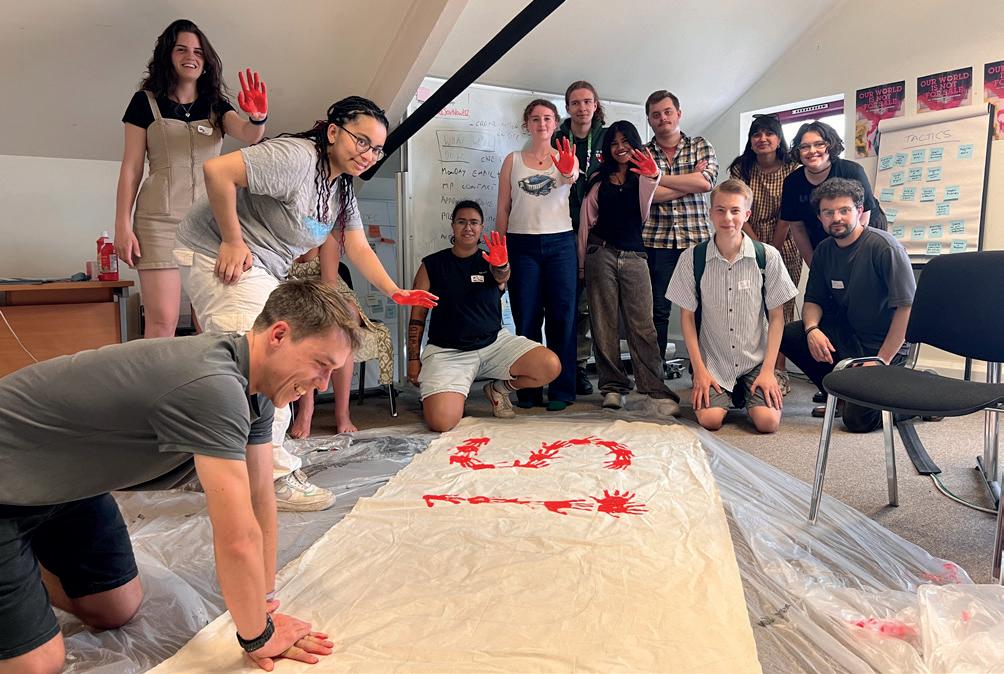
stall at Manchester
school participants outside the GJN office; and making a banner for the upcoming Palestine demo.
freshers follow-up event will include placard making for the next national march for Palestine.
In June, after several months of working with councillors, Global Justice Stirling got the full Stirling council to pass a motion to endorse the Fossil Fuel Treaty! They are also organising a film screening on the intersections of colonialism and environmentalism in Israel’s oppression of Palestinian agricultural workers. The group’s weekly free breakfast on campus is starting up again soon.
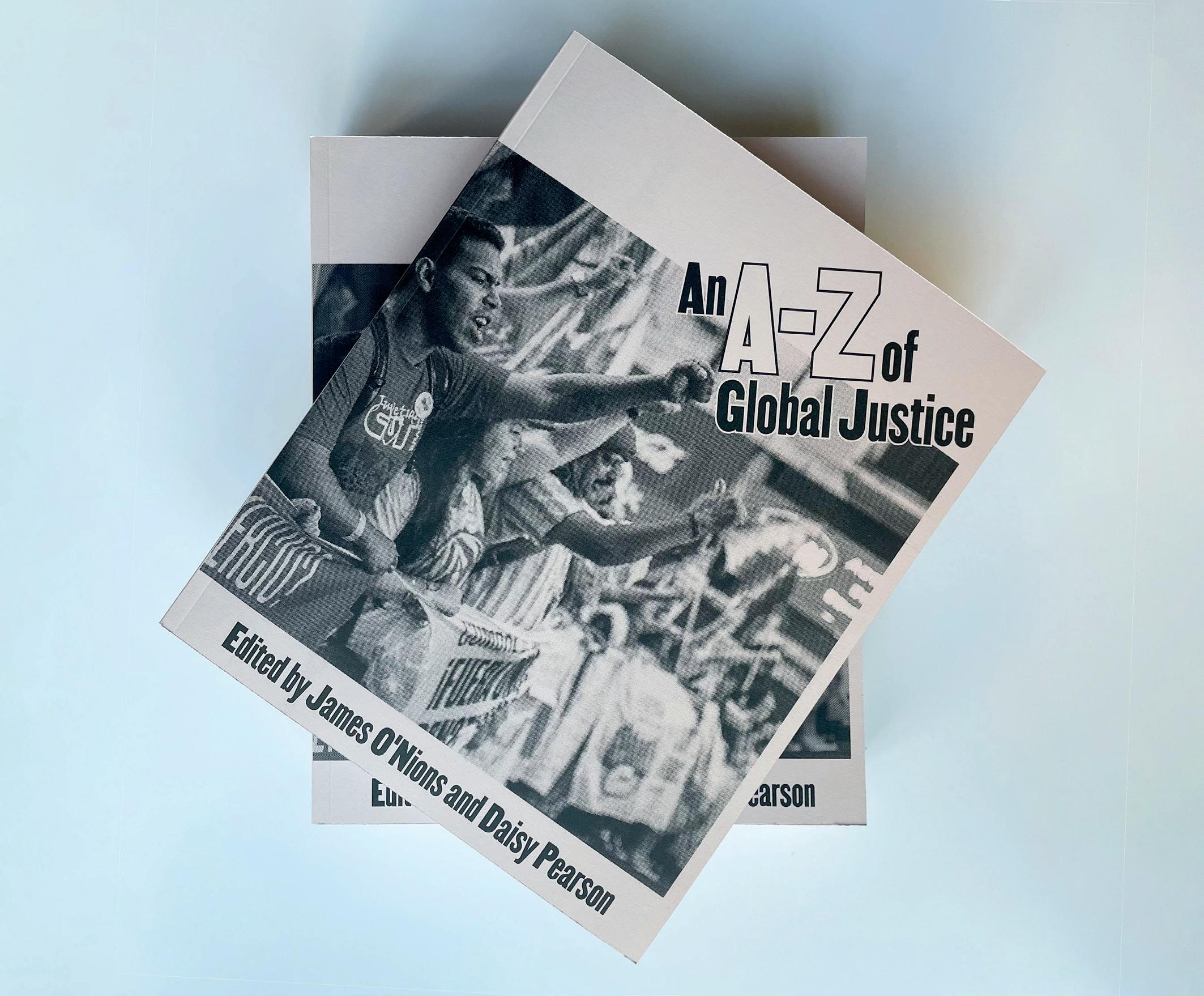
Available to order now!
Global Justice Now has just published a book! An A-Z of Global Justice is a glossary for the fight for a better world, designed to demystify complex issues, provide a clear introduction to key concepts, and equip you with the knowledge you need to take meaningful action.
In 65 bite-sized entries, the book tackles some of the key questions for those of us who want to organise for a better world. How do the global structures of power that sustain injustice work? What are the alternatives to a world ruled by profit and who is organising to bring them about? It’s this understanding
that arms activists with the tools to challenge systems of power, craft solutions, and inspire collective action.
The book costs £15, including postage, and can be ordered online at globaljustice.org.uk/az or using the QR code below.